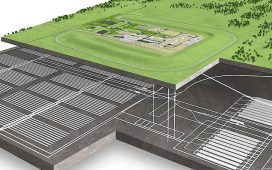Soaring interest rates have clobbered household wealth by £2.1trillion over the past year in the biggest drop since World War 2.
The relentless fall of property prices and pensions is creating a major headache for homeowners and the elderly with household wealth slumping by almost a quarter since 2021, analysts revealed.
The Resolution Foundation think tank estimates suggest total household wealth has fallen to 650 percent of national income in early 2023.
Their latest study – ‘Peaked Interest?’ – warned that if rates remain high, they could drive further falls in wealth to around 550 percent of GDP.
Around 28.2million households could in theory have lost £74,468 each if the £2.1trillion loss was divided.
Resolution Foundation research associate Ian Mulheirn said: “Over the past four decades wealth has soared across Britain, even when wages and incomes have stagnated.
“But rapid interest-rate rises have ended this boom and brought about the biggest fall in wealth since the war, of £2.1trillion. Those with significant mortgages will be hit by these major changes.
“But there are winners too from a shift to a world of higher rates and lower wealth. Higher returns will make it far easier for younger people to save for a pension that delivers a decent standard of living in retirement, while lower house prices will make it easier for younger generations to get on the property ladder and others looking to trade up.”
The fall in wealth stems from the Bank of England’s 13 consecutive interest rise, the think-tank said.
As the base rate continues to rise, the bank are hoping to drive down high inflation, with experts estimating it could rise to 6.25 percent by Christmas.
Currently, the base rate sits at five percent causing mortgage rates to rocket up, house prices to fall and the price of government and corporate bonds to plummet – reducing the value of pensions.
This puts further pressure on those who are coming off a fixed-term deal and those on a variable rate, as their monthly mortgage repayments are set to soar as rates are much higher than they were years ago.
Around one million homeowners are set to pay at least £500 more on their mortgage payments by the end of 2026, the Bank of England has said.
Around 1.7million households re-mortgaging next year are set to see their annual repayments rise by more than £3,000 on average.
Despite rising house rates being painful for current homeowners, this will bring down house prices making them more affordable for first-time buyers – and make it easier to “achieve a decent standard of living in retirement by raising rates of return on pension savings”.











